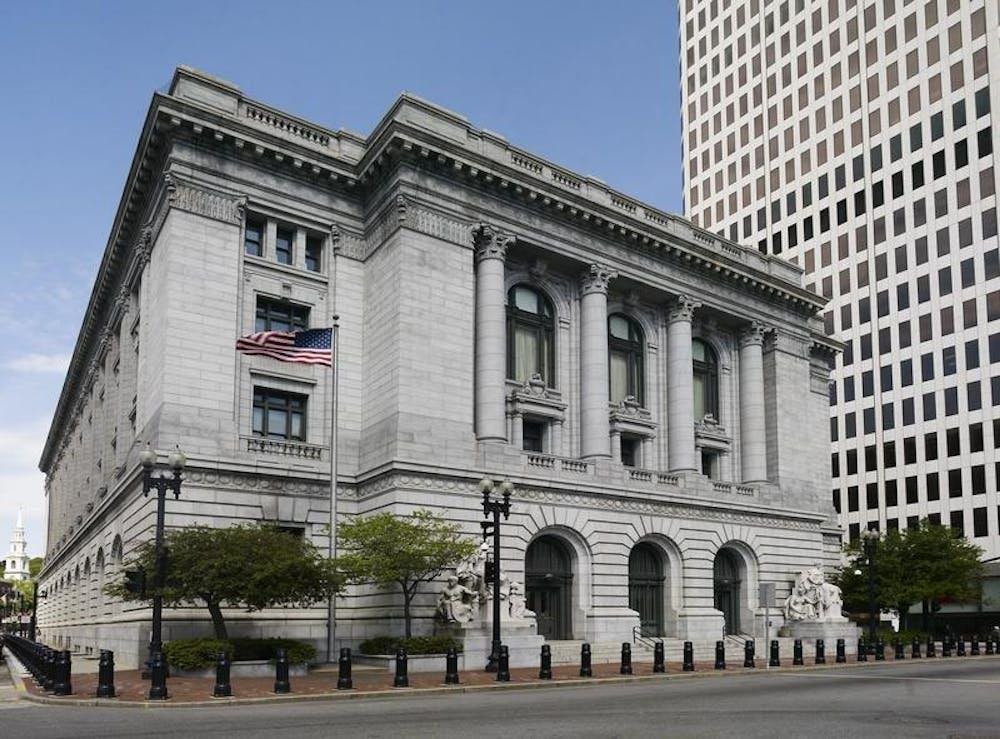Moments after a federal judge temporarily blocked President Trump’s federal funding freeze, the attorneys general of Rhode Island, the District of Columbia and 21 other states filed a separate federal lawsuit challenging the order.
On Jan. 27, the White House budget office ordered a pause on all federal assistance including grants and loans by 5 p.m. Tuesday. In a memorandum sent to government agencies on Monday, Acting Director of the Office of Management and Budget Matthew Vaeth wrote that federal agencies will be required to review all federal financial assistance programs and support “activities consistent with the President’s policies and requirements.”
According to the memo, federal agencies will “temporarily pause” the distribution of federal assistance towards “foreign aid, nongovernmental organizations, DEI, woke gender ideology and the Green New Deal” among others, referring to diversity, equity and inclusion initiatives and economic policies aimed to address climate change.
“Political appointees in the executive branch have a duty to align federal spending and action with the will of the American people as expressed through presidential priorities,” Vaeth added in the memo.
The White House did not immediately respond to The Herald’s request for comment on the memo.
Judge Loren AliKhan, a D.C. federal judge, temporarily blocked the order within the hour before it was set to take effect on Tuesday afternoon, siding with a group of nonprofit organizations, public health officials and small businesses who brought a separate suit earlier Tuesday. The temporary stay will last through Feb. 3.
It is unclear whether the attorneys general were aware of the block prior to the lawsuit’s filing, or how the block may impact the lawsuit.
A spokesperson for R.I. Attorney General Peter Neronha did not immediately respond to a request to comment.
In the suit — filed in the U.S. District Court of Rhode Island — the attorneys general argued that the “OMB Directive violates the (Administrative Procedure Act) and is unconstitutional,” and that withholding funding would “result in immediate and devastating harm to Plaintiff States.”
In a 2 p.m. press conference prior to the official suit, New York Attorney General Letitia James said that “this policy will disrupt the lives of millions of Americans … nationwide.”
The freeze “would result in financial chaos for everyday programs on which people rely to survive,” Neronha said in the press release obtained by The Herald. “If this funding pause is allowed, its devastating impact will be widespread and dangerous.”
The coalition of attorneys general expressed concerns over the pause’s potential impact on key health services including community health centers, disability services, addiction programs and mental health services.
The memo states that the pause would not impact Medicare and Social Security benefits. A clarification sent Tuesday states that “any program that provides direct benefits to Americans is explicitly excluded from the pause and exempted from this review process,” including Medicaid and the Supplemental Nutrition Assistance Program.
But several state legislators noted that state Medicaid programs have since lost access to funding portals to withdraw federal assistance. At the press conference, Massachusetts Attorney General Andrea Campbell said that state officials “tried to draw almost $40 million from Medicaid, and haven’t received the payment yet.”
Karoline Leavitt, the White House press secretary, posted on X Tuesday afternoon writing that “the White House is aware of the Medicaid website portal outage,” confirming that “no payments have been affected.”
The coalition of attorneys general argued that the order would stall funding for “the U.S. Department of Justice’s initiatives to combat hate crimes and violence against women, support community policing and provide services to victims of crimes,” the press release reads.
The coalition also expressed concern over funding for infrastructure projects, including the revitalization of the I-95 Washington Bridge. The project received federal funding from the Bipartisan Infrastructure Law and Inflation Reduction Act, which Trump has linked to the Green New Deal.
“Our states are relying on this money to serve our residents and so this action was necessary and it needed to happen quickly,” Neronha said. “Every American, every Rhode Islander, is impacted by this.”
James described President Trump’s directive as “reckless, dangerous, illegal and unconstitutional.”
“When Congress dedicates funding for a program, the president cannot pull that funding on a whim,” she said. “The president does not get to decide which laws to enforce and for whom.”
The White House did not respond to The Herald’s request for comment on the lawsuit.

Ethan Schenker is a university news editor covering staff and student labor. He is from Bethesda, MD, and plans to study International and Public Affairs and Economics. In his free time, he enjoys playing piano and clicking on New York Times notifications.

Avani Ghosh is a Metro editor covering city and state politics. She is a junior from Ohio studying Health and Human Biology and International and Public Affairs. She is an avid earl grey enthusiast and can be found making tea in her free time.





